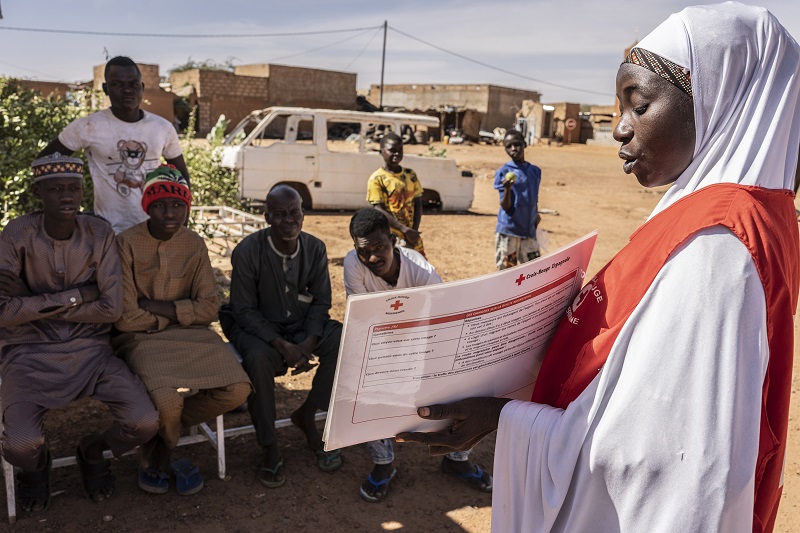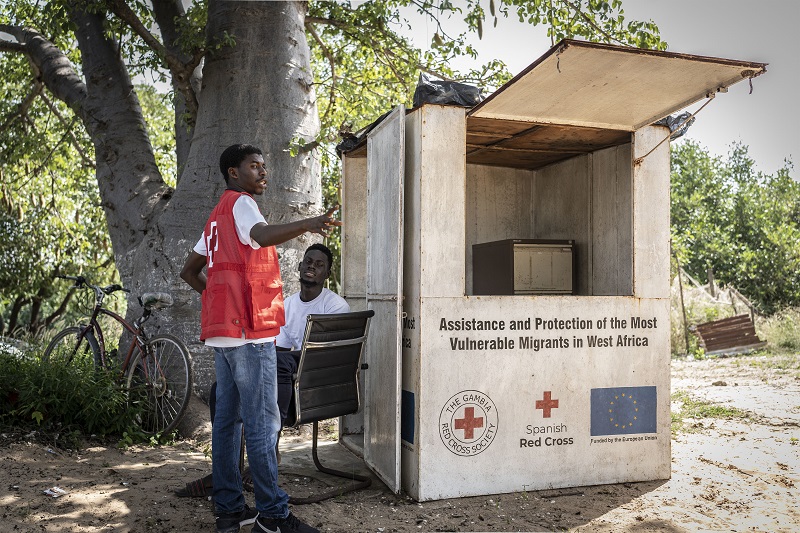Supporting migrants throughout their journeys
In Africa, migration involves large number of people moving both within and from the region. In 2020, around 21 million Africans were living in another African country, a significant increase from around 18 million in 2015. The number of Africans living in different regions also grew during the same period, from around 17 million to over 19.5 million.
In the last decades, the Sahel region has gone through instability and long-term crises. The already difficult living conditions and food insecurity have been exacerbated by attacks and violence since 2019, mainly in northern Burkina Faso, southern Mali and north-western Niger. These conflicts are pushing people to leave their homes. According to the United Nations Office for the Coordination of Humanitarian Affairs (OCHA), in 2021 almost 5.8 million people were displaced across the Sahel, which places additional strain on weak services and scarce natural resources in the region.
On their journeys, migrants often face difficulties in meeting their needs and accessing essential services. They also risk being subject to violence, exploitation and abuse. The lack of economic means forces people to take long breaks in their journey to work and earn money. This can cause tension with the local population, many of whom are also subsisting with limited resources.
To respond to these needs, the Red Cross worked in Burkina Faso, Niger, Mali, Senegal and Gambia to ensure access to essential services for local communities and people in transit experiencing acute vulnerabilities, including survivors of human trafficking. Activities ranged from housing and health assistance to psychosocial and livelihoods support. Training and awareness raising activities with community members and state actors aimed to increase their knowledge and capacities about the risks and protection needs of people on the move. Tailor-made humanitarian diplomacy interventions also helped develop and implement public policies for the protection of migrants at national and regional levels.

Red Cross staff and volunteers seek to meet the needs of migrants in transit, particularly at the borders. The people they help have often undergone lengthy and perilous journeys, leaving them in need of accommodation and psychological support, as well food and other essentials. People’s economic precarity and the fact that they are undocumented not only hinders their access to services, but also puts them at higher risk of sexual abuse or labour exploitation.
Protection services are offered at Humanitarian Service Points (HSP) – neutral spaces where migrants can access a wide range of humanitarian support and services, regardless of their migration status and wherever they are on their journeys. At HSPs, humanitarian assistance is based solely on the principle of humanity and independently of government and other influence. Migrants can also be referred to more specialised assistance if they require support with more complex needs.

"I wanted to come back home but I didn’t have any means to afford my journey, so I decided to go on my own to Banjul (Gambia) and see if there was any way I could get to Guinea”, says Issa, a 19-year-old man from Guinea. When Issa arrived in Kanifing, he was referred to the Red Cross and hosted at a HSP for three days. Once there, the team assessed his situation with a few questions to learn about his needs; providing temporary shelter, psychosocial support, a hygiene kit and clothing. "During the days I spent with the Red Cross all my needs in terms of food and any kind of support were met. This is how my situation began to improve", shared Issa.
When the EU-funded project was coming to a close in early 2023, the Spanish Red Cross carried out advocacy activities towards public authorities in Burkina Faso, Niger, Mali, Senegal and Gambia. Humanitarian diplomacy efforts highlighted the importance of ensuring effective protection and guaranteeing the rights of people on the move to contribute to development, peace and social cohesion.
The Spanish Red Cross ensured the continuation of many of the actions thanks to two new projects supported by the Spanish Agency for International Development Cooperation (AECID): a 4-year programme for the protection and inclusion of the population affected by the human mobility crisis in Mali and Niger, and a 2-year project to support access to protection and comprehensive care for migrant, displaced and host women survivors of violence in Mali. In addition, the Burkinabe Red Cross Society, Niger Red Cross, Mali Red Cross, Senegalese Red Cross Society and the Gambia Red Cross Society are ensuring the continuity of essential services through the HSPs. They do so in collaboration with local authorities, technical services and other organisations.
Despite all these efforts, the needs are greater than the resources available. Partnerships between the different stakeholders and donors are essential to cover humanitarian needs in the region. Responding to the needs of people on the move requires the commitment of transit and donor countries to ensure that people’s rights are respected and that they receive protection and assistance, including reception and integration into host communities.

